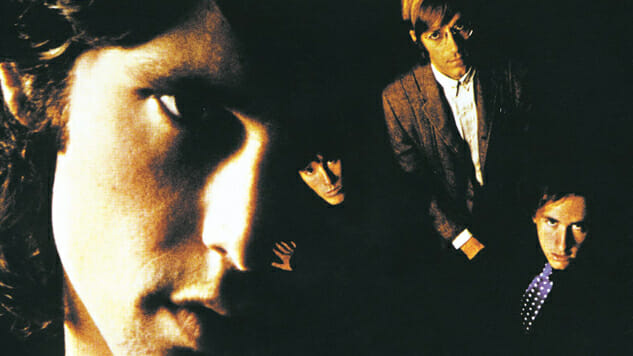The 15 Best Songs by The Doors

The Doors were unlike any other U.S. classic rock act of the 1960s. There was their instrumental make up, first of all: They bucked the default setting of lead guitar-rhythm guitar-bass-drums, instead featuring Robby Krieger on guitar, Ray Manzarek on organ and John Densmore on drums. There was also a dark undertow to the music, a darkness that remained even as the Doors left behind the psychedelia of 1967 for the raw blues of 1970. Finally, they were blessed — and cursed — by having one of the most charismatic lead singers in rock, Jim Morrison. In his prime, the self-proclaimed Lizard King showed off his handsome face and lean physique in a famous series of shots where he posed bare-chested or by wrapping himself in skin-tight black leather. But his determination to explore every byway of the road of excess led not to the expected palace of wisdom but an early death at age 27 (officially due to a heart attack, though drugs likely played a factor). Doors songs probed the mysteries of sex and death, and Morrison seemed to embody both of those primal forces, becoming a rock ‘n’ roll casualty to boot, himself. Spanning the range of those forces, here are the 15 best songs by The Doors.
15. “Hello, I Love You”
Here’s a song that starts out as a jaunty pop ditty, with Morrison teasingly trying to attract the attention of his object of desire (even as he pokes fun at his own ambitions with lyrics like, “Do you hope to make her see you, fool?”). But by the end, he’s screaming in the frustration of one whose passion has been unreciprocated. It gives a harsher edge to what might otherwise have been just another slice of light-hearted teeny pop. Many thought the fuzz-toned melody was inspired by the Kinks’ “All Day and All of the Night,” but Krieger told Guitar World otherwise: “I told John [Densmore] to play something like ‘Sunshine of Your Love.’ So, we ripped off the Cream, not the Kinks.”
14. “The Unknown Soldier”
It was no small irony that this bitter anti-war song was written by an admiral’s son. There’s a topsy-turvy feel to the music that repetitively rises and falls with military precision, as Morrison blithely sings about getting the day’s casualty news over breakfast. The most sinister aspect of the song is the set piece in the middle, where the nameless soldier meets his end not in the glory of battle, but before a firing squad. (In fact, the band would often act out this scenario when they played live, with Krieger “shooting” Morrison dead with his guitar). There’s a glimmer of hope at the end, when Morrison announces the “war is over.” It’s small comfort, though, if you’re already dead.
13. “The Changeling”
This track from 1971’s L.A. Woman is a nice slice of funk. It rumbles along with the assistance of guest bassist Jerry Scheff (a member of Elvis Presley’s live band), as well as Morrison’s tough, muscular vocals. L.A. Woman was the last album released during Morrison’s lifetime, and shows the harder rock direction the band was pursuing—no more dreamy visions or lizard kings. However, the way Morrison drawls out the line “I’m a chaaaange-ling,” suggests some influence from John Lee Hooker’s “Crawling King Snake,” also on the album.
12. “Love Me Two Times”
It might have been the Swinging Sixties, but this song, with its entreaty for a little extra affection before the narrator takes his leave, was deemed too controversial in some quarters and denied airplay when released as a single (which may have accounted for its only reaching No. 25 in the charts). But, “Love Me Two Times” also had a greater resonance during the Vietnam era, when so many soldiers were leaving behind their loved ones. In a different, slower arrangement, this song could’ve been a starker blues number. As it is, Krieger’s buoyant guitar line keeps the number on a higher plane, Manzarak’s harpsichord adds some different color and Morrison’s vocal underscores the rising tension by going up an octave during the final choruses.
11. “When the Music’s Over”
This 11-minute piece—far too sprawling to be considered a conventional song for radio play—doesn’t have the psychological underpinnings of something like “The End,” but is just as dramatic in its own right. A simple keyboard intro from Manzarek leads to a shout from Morrison that’s quickly matched by Krieger’s wailing guitar. But however improvisational the piece feels, it never meanders aimlessly. Some of Morrison’s most recognizable phrases appear (“feast of friends,” “alive she cried,” “scream of the butterfly”), in a number that also takes a detour into environmental awareness, as well as making a demand that would be taken up by a generation: _We want the world, and we want it now!_It’s Morrison’s manifesto, perhaps, with a suitably downbeat conclusion.
-

-

-

-

-

-

-

-

-

-

-

-

-

-

-

-

-

-

-

-

-

-

-

-

-

-

-

-

-

-

-

-

-

-

-

-

-

-

-

-








































